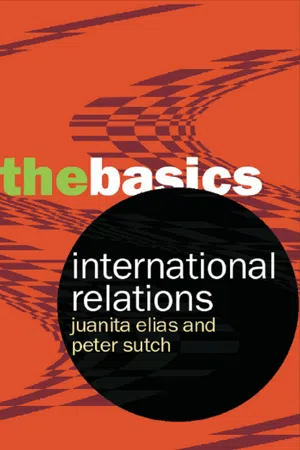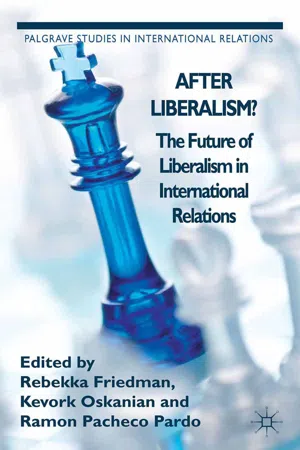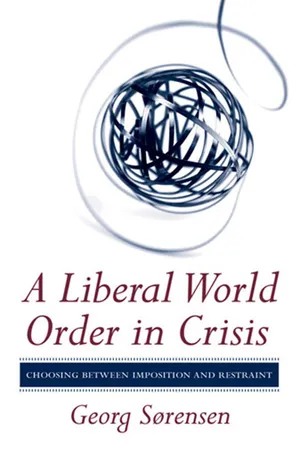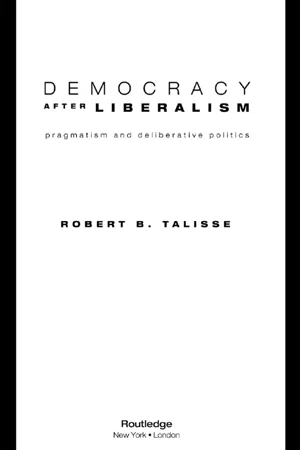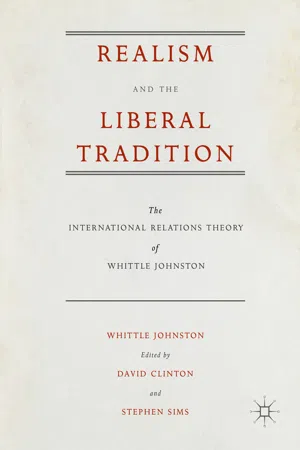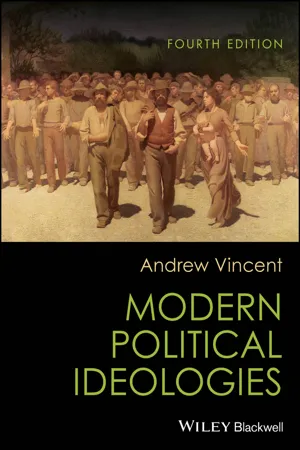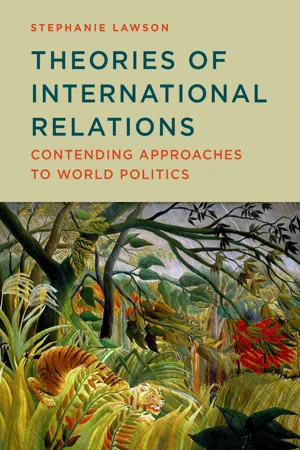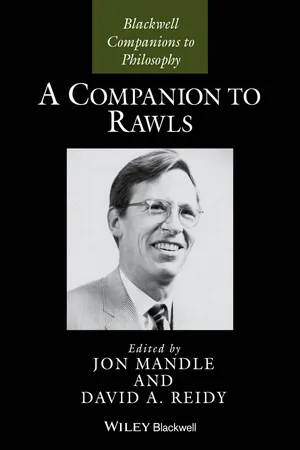Politics & International Relations
Liberalism
Liberalism is a political ideology that emphasizes individual rights, freedom, and equality. It advocates for limited government intervention in the economy and society, and supports the protection of civil liberties and human rights. Liberalism also promotes the idea of a social contract between the government and the governed, with an emphasis on democracy and the rule of law.
Written by Perlego with AI-assistance
Related key terms
Related key terms
1 of 4
Related key terms
1 of 3
9 Key excerpts on "Liberalism"
- eBook - ePub
- Peter Sutch, Juanita Elias(Authors)
- 2007(Publication Date)
- Routledge(Publisher)
Chapter 8 ). A grasp of the basics of Liberalism therefore requires both an understanding of the history of liberal institutionalism and an understanding of liberal ethics.THE INTELLECTUAL HISTORY OF Liberalism
Because normative Liberalism was sidelined for so long in IR, students are often not fully introduced to the intellectual history of Liberalism. The study of ethics and morality is often ignored or thought of as properly the subject of a different class such as political theory which is rarely mandatory for students of IR. This is partly because realism rejected morality as irrelevant to the study of the proper subject of IR – power. However, the claim that IR is solely, or even primarily, the study of power is itself a contentious argument. Liberalism, in very broad terms, is a series of arguments about why we should study other aspects of world politics such as international law, human rights, economic cooperation or justice. Liberalism describes the very rich and diverse traditions of thought that ascribe real value to internationalism in political and international thought. For the canonical thinkers in this tradition morality has a key place in our political thinking as ultimately it is individuals, rather than states, that are important in international relations (as in all life). Theories that fall in to this broad tradition have very different reasons for their internationalism and see very different consequences flowing from their positions. Some liberals argue for the progressive development of international law, others for a reordering of the institutions of world politics on democratic or cosmopolitan lines, some urge a greater respect for human rights and global economic justice, others for a free market. To dismiss all liberal arguments as utopian is to dismiss a complex range of arguments that appear throughout the history of ideas in political and international thought. - eBook - ePub
After Liberalism?
The Future of Liberalism in International Relations
- R. Friedman, K. Oskanian, R. Pachedo Pardo, R. Friedman, K. Oskanian, R. Pachedo Pardo, Kenneth A. Loparo, R. Friedman, K. Oskanian, R. Pachedo Pardo, Ramon Pacheco Pardo(Authors)
- 2013(Publication Date)
- Palgrave Macmillan(Publisher)
In the second section of this chapter, I will therefore try to recapture the core of Liberalism by bridging the very divisions that lead to these partial conceptions. To this end, I will return to John Locke’s pre-disciplinary formulation of protoliberal principles, which explicitly theorise the connections between their core aspects and their political dynamics. This Lockean account of Liberalism and its political dynamics, moreover, is broadly substantiated by the historical development of Liberalism.Viewed through the lens of this alternative concept, recent history shows neither a “rise” nor a “fall” of Liberalism. Instead, the shifts that undoubtedly characterise this period simply indicate Liberalism’s adjustment to the power political opportunities and constraints provided by the international system. In short, they are shifts in form rather than substance. What comes “after Liberalism”, I therefore conclude, is simply a different register of Liberalism.Liberalism – DividedDuring the 1990s, a wide range of policies was prominently associated with Liberalism. Among them were the liberalisation, deregulation, and privatisation of the international economy, the development of the World Trade Organization (WTO), and the transformation of former communist into capitalist states – in short, neoliberal economic policies. Proactive democracy promotion, as well as the widespread attempt to establish liberal market democracies as solution to failed, conflict-ridden, or even simply authoritarian states played an important role in the foreign policies of liberal states, of NGOs, and of international organisations and institutions, and gave rise to the notion of “liberal peacebuilding”. Liberalism was also associated with the proactive protection of human rights, not least in the form of humanitarian intervention as well as with plans to reform international law and international organisations in accordance with “a world of liberal states” (Clark, 2009; Keohane, 2003; Slaughter, 1995).In contrast to this spread of liberal norms, practices, and institutions, power politics generally associated with realism characterised the prior Cold War period. Capitalism, free trade, and free market principles were confined to the Western sphere of influence and tempered, domestically and internationally, by considerations of political stability. Democracy promotion was equally restricted and generally trumped by power political considerations; hence extensive alliances with authoritarian states and interventions in support of sympathetic rather than democratic regimes predominated. Human rights were generally subordinated to the principle of sovereignty. In short, the “rise” of Liberalism was associated with the increase in policies explicitly designed to spread liberal norms, practices, and institutions. And it was the retreat from these policies towards the end of the 1990s and a more explicit turn towards traditional power politics after 9/11 that seemed to indicate a “fall” of Liberalism. - eBook - ePub
A Liberal World Order in Crisis
Choosing between Imposition and Restraint
- Georg Sørensen(Author)
- 2011(Publication Date)
- Cornell University Press(Publisher)
Plan for an Universal and Perpetual Peace in 1789 (Bentham 1927) developed the idea that international law and international institutions would advance international peace and cooperation. Liberalism is a theory and philosophy of modernization and progress. Liberals believe that social and political institutions can be changed for the better (Gray 1995: xii); they “have a faith in the power of human reason and human action to change [the world] that the inner potential of all human beings can be more fully realized” (Howard 1978: 11).Liberal theorists thus believe that human reason can triumph over human fear and the lust for power. In contrast to realists, they hold that international politics need not be “the same damned things over and over again”; cooperative anarchies and peaceful “security communities” are a real possibility (Deutsch et al. 1957). But they diverge on the magnitude of the obstacles on the way to human progress. For some liberals, it is a long-term process with many setbacks and success is not certain; for others, change can go very fast.Drivers and Facilitators of Liberal Progress
Liberals identify a series of different drivers and facilitators of progress. Progress can come from individuals and groups in civil society, that is, from below; or it can come from liberal governments, that is, from above. It can come from primarily political or primarily economic sources, and it can come from a transformation within states as well as from changing relations between states. The principal drivers of progress are, first, social and economic relations across borders between individuals and private groups, and, second, republican rule, that is, governments founded on liberal principles and institutions. These stimulate international cooperation based on common moral values, and such cooperation is in turn significantly strengthened by international institutions that incorporate relations based on liberal principles. Among the most important facilitators are technological change and education. Liberals do not agree fully on the relative importance of all these elements, but such diversity should not be overstated; for most liberals, each of these factors constitutes a component in a larger process of modernization and progress.2 - eBook - ePub
- Bruce Russett(Author)
- 2011(Publication Date)
- Routledge(Publisher)
11Liberalism
The most important transformation in world politics over the past sixty years derives from the concurrent and interlinked expansion of three key phenomena associated with Liberalism and its emphasis on the potentially peace-promoting effects of domestic and transnational institutions. One is the spread of democracy throughout most of the world. A second is the multiple networks of communications, trade, and finance often summarized as globalization. The third is the multiplication of intergovernmental organizations, especially those composed primarily of democratic governments. Each of these supports and extends the other in a powerful feedback system envisioned by Immanuel Kant. Moreover, each creates a set of norms and interests which dramatically reduce the risk of violent conflict among the countries so linked. Contemporary Europe constitutes the prime example of these processes at work, but they are not limited to Europe or to developed economies.The world is full of testimony to tragedy. Governments oppress their own people and commit aggression against their neighbors. World politics is conducted in a condition of anarchy as that term was used by the Greeks: not chaos, but “without a ruler,” having no overarching authority to enforce order. There is some order, but on a globe far from ready for world government most order is not something imposed from above.Realists say that every country is potentially an enemy of every other—intentionally or not, a threat to their security and very existence. In the absence of a world state they are caught forever in this precarious condition of freedom and risk. This tradition, like the anarchy that underlies it, has a history from Thucydides, Niccolo Machiavelli, and Thomas Hobbes, and shapes the perspective of many policy-makers. Yet there are restraints on the use of force. States do not fight all others even when purely realist principles dominate; they are constrained by geography, the coincidence of national interests expressed in alliances, and the balance of power. Deterrence forms the heart of survival, but deterrence—and especially nuclear deterrence—is an uncertain and dangerous way of avoiding war. Treating all international politics as unending struggle, and everyone as a potential enemy, risks becoming a self-fulfilling prophecy. - eBook - ePub
Democracy After Liberalism
Pragmatism and Deliberative Politics
- Robert Talisse(Author)
- 2005(Publication Date)
- Routledge(Publisher)
CHAPTER 2What Liberalism IsLiberalism in Political Discourse
It is not uncommon today to hear Liberalism identified with the political commitments characteristic of the Democratic party in the United States. The liberal, in this sense of the term, is one who favors social principles that emphasize the need for federal intervention to establish and maintain a just distribution of wealth, healthcare, education, and other social goods. The liberal is opposed to the conservative, who is in turn often associated with the political programs characteristic of the Republican party in the United States. Conservatism is marked by a trust in the principles of free-market economics—competition among providers of goods, individual initiative, nonintervention at the federal level, and decentralization—as sufficient means to social justice.The conservative thus sees the liberal political program as excessive. According to the conservative, the governmental agencies and institutional apparatus necessary to secure the envisioned distribution of social goods pose a threat to freedom. Hence, Robert Nozick, an extreme conservative, has argued that the scheme of taxation necessary to fund liberal social programs is “on a par with forced labor” (1974, 169), as it “seize[s] some of a man’s leisure (forced labor) for the purposes of serving the needy” (1974, 170). Nozick argues that mandatory taxation is intrusive, an unjust interference with individual liberty.Liberals, by contrast, argue that individual liberty can be secured only under certain social conditions. For any reasonable set of individual liberties, liberals maintain that a corresponding set of political and economic conditions exist which are necessary for their exercise. Moreover, they maintain that the free market is insufficient for liberty; the conditions necessary for liberty prevail only in the presence of the kind of redistributive interventions disparaged by conservatives. A striking example of this position is developed by Henry Shue (1980), who argues for an extensive set of basic rights to healthcare, education, and financial security, on the grounds that a certain degree of health, education, and wealth is necessary for the full exercise of one’s political rights. A state that does not engage in activity designed to compensate for inequalities obstructs liberty, for it fails to create and sustain conditions necessary for individual freedom. - eBook - ePub
Realism and the Liberal Tradition
The International Relations Theory of Whittle Johnston
- Whittle Johnston, David Clinton, Stephen Sims(Authors)
- 2016(Publication Date)
- Palgrave Macmillan(Publisher)
It is possible to look at the liberal-democratic tradition in a number of different ways, and in general, an effort is made to link it with some form or other of freedom. For example, it was for long closely related and linked with laissez-faire capitalism, whereas others saw it intimately related to freedom of religion. Several forms of freedom have been seen as components of the liberal tradition, but they are merely components; they do not represent the totality or the “essence” of the system. The aspect under which I would like to consider Liberalism this evening is as a system for the accomplishment of peaceful change or, to put in other terms, a system for conflict resolution. And the problem which will be central to our concerns this evening, and throughout the entire semester, turns on the relevance of Liberalism as a system of conflict resolution for the problems of world politics. To assess this relevance, it is necessary to have some image of the means by which the liberal tradition has dealt with the problem of change, some image of the basic character of international politics, and an estimate of the possible bearing the experiences of that tradition might have on the problems of that area.There are many assumptions which underlie the liberal approach to politics, and a number of these will be touched on in the course of our proceedings. The first is that change is real and that change can be good. It is easy to characterize the liberal in very broad terms by setting him apart from two more extreme viewpoints. This does not give us a very precise insight into Liberalism, but it is of use in a general way. The liberal is not a consistent conservative, who would hold on to every element in the present order and not acquiesce one jot or tittle to change. This variant of uncompromising conservatism is alien to the liberal orientation and is felt to lead inevitably to a recessive condition for a number of reasons. One has to do with the conditions of Liberalism’s birth, for the movement comes into being in good part in response to the changes consequent upon technological dynamism and the recurrent revolution in the scientific world view. Liberals have long (and at times uncritically—as with John Dewey) seen in the scientific and technological revolution as their natural allies; in truth the relation between science, technology, and Liberalism is far more conjectural than the simple faith Dewey admitted. Beyond this, there is operative the pull of the “ideal end” of Liberalism: the hope that one can achieve a society of equality, of freedom, and of plenty. The “ideal end” of Liberalism embraces components from the Biblical tradition and is largely a notion of the “heavenly city” that can be brought to earth. It is for this reason no less compelling, on the contrary. Beyond these two factors of the scientific-technological revolutions and the pull of the “heavenly city,” Liberalism sees in the general diversity of the human condition—most unmistakably revealed in the eternally renewed generation gap—a fundamental source of change. Hence it is easy to show that the liberal is different in orientation from the uncompromising conservative. It is perhaps more difficult to show how the liberal differs from the ever-compromising relativist, whose genial tolerance for change seems to find expression in the phrase “anything goes.” But in truth anything does not go, or, if it does, much that is priceless goes with that which is worthless. - eBook - ePub
- Andrew Vincent(Author)
- 2023(Publication Date)
- Wiley-Blackwell(Publisher)
2 LiberalismLiberalism is the most complex and intricate of ideologies. It has permeated so deeply into the cultural life of the West that it is difficult to disentangle the partisan from the more objective commentary. Much academic study (in fact the notion of the liberal academic mind) is founded on the assumptions of tolerance or diversity. A great deal of contemporary political philosophy in the Anglosphere, specifically in the writings of figures such as John Rawls, Michael Walzer and Friedrich Hayek, deals largely with liberal themes.The oldest apolitical use of the word ‘liberal’ denotes a type of education. From the Middle Ages it implied two things: first, a broad or wide‐ranging education; second, the education of a gentleman and freeman (liber). We have not lost the first sense of the term, although it seems to come into periodic disfavour in educational and political circles. The notion of a ‘liberal education’ is now often strongly linked with the disciplines of the humanities. The liberal education is said to cultivate a certain critical disposition or habit of mind. Yet the term can be complimentary or pejorative. The complimentary sense implies broadmindedness or generosity (the latter is more easily caught in the word liberality), seen as a virtue. From the late sixteenth century there was another sense of the term which was opprobrious, namely, where liberal implied licence. This is close to the word libertine, which from the sixteenth century implied not only sexual licence and lack of regard for moral laws, but also addiction to antinomian opinions in religion. In Shakespeare’s Othello, when Desdemona refers to Iago as ‘a most profane and liberal counsellor’, she was not, we can assume, complimenting him. This opprobrious, more abusive sense of liberal is still in use today.A third sense identifies the concept ‘liberal’ with certain kinds of moral values. In other words, there are a series of values (tolerance, progress, liberty, individualism) which long pre‐date the word - eBook - ePub
Theories of International Relations
Contending Approaches to World Politics
- Stephanie Lawson(Author)
- 2015(Publication Date)
- Polity(Publisher)
Another boost to liberal ideas brought about by the end of the Cold War was the ‘end of history’ thesis, which rests on the assumption that the failure of communism in its heartland signalled the final triumph of both capitalism and liberal democracy as the only really viable economic and political systems. These developments stimulated fresh liberal theorizing on the ‘democratic peace’, although this was to be more or less hijacked under the administration of George W. Bush as a part of the justification for a war that actually contravened liberal principles. This prompted in turn the further elaboration of another liberal idea, ‘soft power’, which may be understood as a form of public diplomacy suited to a complex world which simply cannot be managed effectively through coercion or economic manipulation. Continuing problems of violence and suffering within states in the post-Cold War world have also seen the principle of non-intervention come under greater scrutiny, with notions of humanitarian intervention and ‘the responsibility to protect’ challenging the principle of inviolable state sovereignty. In addressing these and other issues introduced above, we shall see more clearly the tensions between realist and liberal visions of world order as they developed from the early twentieth century onwards.Liberalism and the Rise of International Institutions
It has been suggested that liberals writing after world wars have usually been on the defensive about human nature but have nevertheless persisted in ‘resisting the dark conclusions of the realists’ (Smith, 1992, p. 203). But such resistance, while requiring a certain optimism about the possibilities for progress, has rarely entailed a starry-eyed view of natural human goodness on the part of serious liberal writers. Two of the most prominent liberals of the early twentieth century, Leonard Woolf and Norman Angell, adopted a much more circumspect view (Sylvest, 2004, p. 424). Angell’s book Human Nature and the Peace Problem - eBook - ePub
- Jon Mandle, David A. Reidy, Jon Mandle, David A. Reidy(Authors)
- 2013(Publication Date)
- Wiley-Blackwell(Publisher)
all well-ordered societies.Despite the cynicism of some commentators, others have accepted Rawls's vision of international politics on its own terms – at least to the extent that it has allowed them to discuss and analyze some of his ideas in a productive manner and to speculate as to what they might bring to our understanding of various aspects of world politics. There were early examples of such writings (Brown 2002; Wenar 2001), but somewhat of a sea change was signaled with the publication of Rex Martin and David Reidy's volume (2006), which included a series of prominent and thoughtful contributions. It was an important demonstration that LP is a serious work with much to offer. More recent publications on a range of issues suggest the book is increasingly recognized as one of Rawls's key texts, exemplified by critical discussions of LP with regard to the World Trade Organization (Maffettone 2009), human security (Agafonow 2011) and climate change (Gardiner 2011). I will focus here, however, on two themes of world politics that are directly linked to the two key strands of the cosmopolitan critique: the supposedly excessive toleration of nonliberal societies, and the lack of substantial measures to address global poverty. This is in part because a reposte to these criticisms does much to blunt this critique and thereby assert the relevance of LP, but more importantly because Rawls has something original and thought-provoking to say on both matters.A great deal has been written on how misconceived the omission of a global distributive principle is on Rawls's part. There is no need to recapitulate here the many versions of this argument, but the most forceful of these is the claim that even accepting Rawls's social holism and the framework of a society of peoples, there should still by his own standards be an international distributive principle, given the need to mitigate the influence of economic inequalities on weak states' development.1
Index pages curate the most relevant extracts from our library of academic textbooks. They’ve been created using an in-house natural language model (NLM), each adding context and meaning to key research topics.
Explore more topic indexes
Explore more topic indexes
1 of 6
Explore more topic indexes
1 of 4
